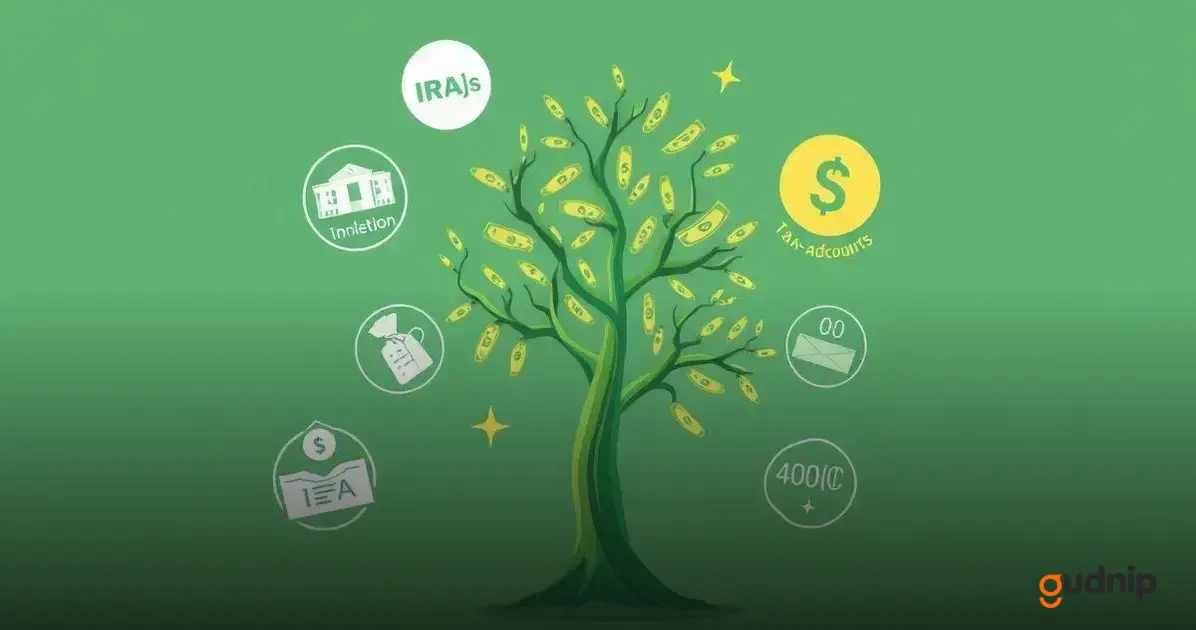Long-term wealth-building strategies are crucial in today’s financial climate.
By focusing on effective investment techniques, individuals can create a sustainable future.
Understanding Long-term Wealth-Building Strategies
Understanding long-term wealth-building strategies starts with the idea of saving and investing your money wisely.
It’s not just about earning a paycheck; it’s about making your money work for you over time.
By focusing on the future, you can set financial goals that lead to greater security and freedom.
One key aspect is to diversify your investments. This means spreading your money across different types of assets like stocks, bonds, and real estate
. Doing this helps reduce risk and can lead to better returns over the long run.
When you understand how to balance these investments, you increase your chances of building lasting wealth.
Additionally, having a budget is essential. A budget helps you keep track of your income and expenses, ensuring that you are saving a portion for investments.
This steady approach allows you to accumulate wealth gradually, paving the way for a stable financial future where you can enjoy the fruits of your hard work.
The Importance of Diversification
The importance of diversification cannot be overstated when it comes to building long-term wealth.
By spreading your investments across various sectors and asset types, you can protect yourself from big losses.
If one investment does poorly, others may do well, helping to balance your overall financial health.
When you diversify, you also increase your chances for higher returns. Different investments perform well at different times.
For instance, stocks might be great in a booming economy, while bonds could be safer during a downturn.
A balanced approach means you can earn money even when the market fluctuates.
Additionally, diversification can offer peace of mind. Knowing that your investments are not all tied to one source reduces anxiety about market changes
. You can feel secure knowing that any ups and downs are less likely to affect your entire portfolio.
This stability is crucial for achieving your long-term financial goals.
Investing in Real Estate for Long-term Gains

Investing in real estate can be a smart way to build long-term wealth.
Unlike stocks, real estate often appreciates over time, meaning its value usually increases.
When you buy a property, you are not just acquiring a physical asset; you are making a move toward financial stability and growth.
Another benefit of real estate investment is the potential for passive income.
By renting out properties, you can earn monthly payments while the property value continues to rise.
This steady income stream can supplement your earnings and provide financial freedom in the long run. It can help you save and invest even more.
However, it’s essential to do your homework before diving in.
Understanding the real estate market, location trends, and property management is key to success.
With the right approach, investing in real estate can be a rewarding strategy for achieving your long-term financial goals.
Stocks vs. Bonds: Long-term Wealth Strategies
When considering stocks vs. bonds for long-term wealth strategies, it’s important to understand what each offers.
Stocks represent ownership in a company and have the potential for high returns.
However, they can be volatile, meaning their value can go up and down quickly. This can be exciting, but it also comes with more risk.
Bonds, on the other hand, are essentially loans you give to companies or the government.
In return, they pay you interest over time and promise to return your money later.
While bonds usually provide lower returns compared to stocks, they are typically less risky.
This steady income can be comforting, especially during unpredictable market conditions.
Many experts suggest having a mix of both stocks and bonds in your investment portfolio.
This mix allows you to enjoy the growth potential of stocks while also having the stability that bonds provide.
By understanding the balance between the two, you can create a robust strategy for long-term wealth that fits your financial goals.
Creating Passive Income Streams
Creating passive income streams is a powerful way to build wealth over time.
Unlike active income, where you trade time for money, passive income allows you to earn money with minimal effort once the initial setup is complete.
This could be achieved through methods like rental properties, dividend-paying stocks, or online businesses that generate revenue without constant work.
One of the most popular ways to create passive income is by investing in real estate.
When you own rental properties, you can collect rent each month, which can provide steady income.
Even after the initial purchase, the income continues as you benefit from property appreciation over the years.
Another option for passive income is creating digital products, such as e-books or online courses.
Once you develop these products, they can be sold repeatedly without much additional work.
By diversifying your income sources, you increase your financial security and have more freedom to enjoy life while your money works for you.
Tax-Advantaged Investment Accounts

Tax-advantaged investment accounts are special types of savings accounts that allow you to grow your money while paying less in taxes.
Two common examples are Individual Retirement Accounts (IRAs) and 401(k) plans.
These accounts offer unique benefits that can help you save for the future while keeping more of your earnings.
When you invest in these accounts, your money can grow without being taxed until you withdraw it.
This makes a big difference over time, as your investments can earn interest and compound.
For instance, if you contribute to a 401(k) and your employer matches your contributions, it’s like free money that increases your savings.
Using tax-advantaged accounts is a crucial part of a successful long-term wealth-building strategy.
They not only help you save on taxes but also encourage you to invest for retirement.
By planning ahead and taking advantage of these accounts, you can secure a brighter financial future.
The Role of Budgeting in Wealth Building
The role of budgeting in wealth building is vital for anyone looking to secure their financial future.
A budget helps you track your income and expenses, allowing you to see where your money goes each month.
By understanding your spending habits, you can identify areas where you can save more and invest in your future.
Creating and sticking to a budget encourages responsible spending.
It helps you prioritize your needs over wants and allows you to allocate funds to essential areas.
When you set aside money for savings and investments, you build a strong foundation for long-term wealth.
Over time, these small adjustments can lead to significant financial growth.
Moreover, budgeting can reduce financial stress. Knowing exactly where you stand financially gives you control over your money.
By forming healthy financial habits now, you pave the way for greater opportunities, such as buying a home or retiring comfortably.
Budgeting is not just a tool; it’s a stepping stone to achieving your financial dreams.
Financial Literacy: A Key to Success
Financial literacy is crucial for achieving success in today’s complex world.
It means understanding how money works, including how to earn, save, invest, and spend wisely.
When you have a solid grasp of financial concepts, you are better equipped to make informed decisions that can lead to greater financial stability and growth.
Being financially literate allows you to set realistic goals and create plans to achieve them.
You can learn the importance of budgeting, managing debt, and building savings.
With these skills, you can avoid common pitfalls that many people face, such as overspending and falling into debt traps.
This knowledge breeds confidence in managing not only your money but also your future.
Furthermore, financial literacy empowers you to take control of your economic destiny.
It equips you with the tools to invest in your education and career, start a business, or prepare for retirement.
By making smart financial choices, you pave the way for long-term success, ensuring that your efforts today will bear fruit in the future.
Long-term wealth-building strategies involve making smart financial decisions that will benefit you for years to come.
It’s not just about saving money; it’s about investing wisely and planning for the future.
Understanding how your money can grow over time is key to building a secure financial foundation.
To build wealth effectively, it’s important to diversify your investments.
This means spreading your money across different areas, such as stocks, bonds, and real estate.
By doing this, you lower the risk of losing money and increase your chances of gaining in various markets.
A well-balanced portfolio can provide steady growth and help you achieve your financial goals.
In addition, creating multiple income streams can significantly enhance your wealth-building efforts.
Whether it’s through side businesses, investments, or rental properties, having different sources of income allows you to grow your wealth more efficiently.
With time, patience, and discipline, these strategies can help you unlock financial freedom.





